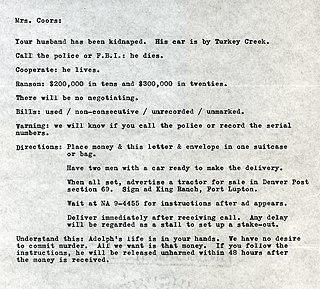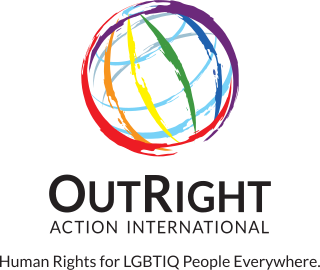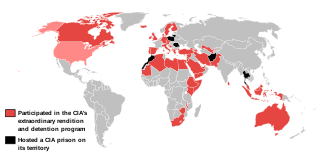Related Research Articles

The United Nations Population Fund (UNFPA), formerly the United Nations Fund for Population Activities, is a UN agency aimed at improving reproductive and maternal health worldwide. Its work includes developing national healthcare strategies and protocols, increasing access to birth control, and leading campaigns against child marriage, gender-based violence, obstetric fistula, and female genital mutilation.

The International Commission of Jurists (ICJ) is an international human rights non-governmental organization. It is a standing group of 60 eminent jurists—including senior judges, attorneys and academics—who work to develop national and international human rights standards through the law. Commissioners are known for their experience, knowledge and fundamental commitment to human rights. The composition of the Commission aims to reflect the geographical diversity of the world and its many legal systems.

Extraordinary rendition is a euphemism for state-sponsored kidnapping in another jurisdiction and transfer to a third state. The phrase usually refers to a United States-led program used during the War on Terror, which had the purpose of circumventing the source country's laws on interrogation, detention, extradition and/or torture. Extraordinary rendition is a type of extraterritorial abduction, but not all extraterritorial abductions include transfer to a third country.
Physicians for Human Rights (PHR) is a US-based not-for-profit human rights NGO that uses medicine and science to document and advocate against mass atrocities and severe human rights violations around the world. PHR headquarters are in New York City, with offices in Boston and Washington, D.C. It was established in 1986 to use the unique skills and credibility of health professionals to advocate for persecuted health workers, prevent torture, document mass atrocities, and hold those who violate human rights accountable.

The Guatemalan Civil War was a civil war in Guatemala fought from 1960 to 1996 between the government of Guatemala and various leftist rebel groups. The government forces have been condemned for committing genocide against the Maya population of Guatemala during the civil war and for widespread human rights violations against civilians. The context of the struggle was based on longstanding issues of unfair land distribution. Wealthy Guatemalans, mainly European-descended, and foreign companies such as the American United Fruit Company had dominated control over much of the land, and paid almost zero taxes in return – leading to conflicts with the rural indigenous poor who worked the land under miserable terms.

OutRight International (OutRight) is an LGBTIQ human rights non-governmental organization that addresses human rights violations and abuses against lesbian, gay, bisexual, transgender and intersex people. OutRight International documents human rights discrimination and abuses based on their sexual orientation, gender identity, gender expression and sex characteristics in partnership with activists, advocates, media, NGOs and allies on a local, regional, national and international level. OutRight International holds consultative status with ECOSOC.
Russia incurred much international criticism for its conduct during the Second Chechen War, which started in 1999. The governments of the United States and other countries condemned deaths and expulsions among civilians. The United Nations Commission on Human Rights (UNHCR) passed two resolutions in 2000 and 2001 condemning human rights violations in Chechnya and requiring Russia to set up an independent national commission of inquiry to investigate the matter. However, a third resolution on these lines failed in 2004. The Council of Europe in multiple resolutions and statements between 2003 and 2007 called on Russia to cease human rights violations. The European Court of Human Rights (ECHR) between 2005 and 2007 conducted legal cases brought by Chechens against the Russian government, and in many of these cases held Russia responsible for deaths, disappearances and torture.
There are cases, both documented and alleged, that involve the usage of torture by members of the United States government, military, law enforcement agencies, intelligence agencies, health care services, and other public organizations both in and out of the country.
The UNROW Human Rights Impact Litigation Clinic is a student litigation and advocacy project at American University's Washington College of Law.
The United Nations International Day in Support of Victims of Torture is an international observance held annually on 26 June to speak out against the crime of torture and to honour and support victims and survivors throughout the world.
This is a day on which we pay our respects to those who have endured the unimaginable. This is an occasion for the world to speak up against the unspeakable. It is long overdue that a day be dedicated to remembering and supporting the many victims and survivors of torture around the world.
On this International Day in Support of Victims of Torture, we express our solidarity with, and support for, the hundreds of thousands of victims of torture and their family members throughout the world who endure such suffering. We also note the obligation of States not only to prevent torture but to provide all torture victims with effective and prompt redress, compensation and appropriate social, psychological, medical and other forms of rehabilitation. Both the General Assembly and the Human Rights Council have now strongly urged States to establish and support rehabilitation centers or facilities.

Dianna Mae Ortiz was an American Roman Catholic sister of the Ursuline order. While serving as a missionary in Guatemala, during its civil war, she was abducted on November 2, 1989 by members of the Guatemalan military, detained, raped, and tortured for 24 hours before being released. After her release, Ortiz reported that an American was among her captors. This part of her account could not be confirmed.
This article deals with the activities of the Central Intelligence Agency (CIA) of the federal government of the United States that are violations of human rights.
The U.S. Central Intelligence Agency (CIA) has a history of interference in the government of Guatemala over the course of several decades. Guatemala is bordered by the North Pacific Ocean and the Gulf of Honduras. The four bordering countries are Mexico, El Salvador, Honduras and Belize. Due to the proximity of Guatemala to the United States, the fear of the Soviet Union creating a beachhead in Guatemala created panic in the United States government during the Cold War. The CIA undertook Operation PBSuccess to overthrow the democratically elected Jacobo Árbenz in the 1954 Guatemalan coup d'état. Carlos Castillo Armas replaced him as a military dictator. Guatemala was subsequently ruled by a series of military dictatorships for decades. Between 1962 and 1996, Left-wing guerrillas fought the U.S. backed military governments during the Guatemalan Civil War.
The Central Intelligence Agency focuses on fighting two major conflicts, the cultivation and trafficking of cocaine and the local extremist groups in Colombia. The Revolutionary Armed Forces of Colombia (FARC) is one of the main extremist groups in Colombia. The CIA activities revolve heavily around stopping the production of cocaine, and stopping the FARC.
The Center for Justice and Accountability (CJA) is a US non-profit international human rights organization based in San Francisco, California. Founded in 1998, CJA represents survivors of torture and other grave human rights abuses in cases against individual rights violators before U.S. and Spanish courts. CJA has pioneered the use of civil litigation in the United States as a means of redress for survivors from around the world.
Jennifer K. Harbury is an American lawyer, author, and human rights activist. She has been instrumental in forcing the revelation of the complicity of the United States CIA in human rights abuses, particularly in Guatemala and other countries of Central America during the 1980s and 1990s. Initially, she was trying to discover the fate of her husband Efraín Bámaca Velásquez, a Mayan guerrilla leader who was "disappeared" in March 1992 by the Guatemalan military.

The Torture Abolition and Survivors Support Coalition International (TASSC) is a non-governmental, nonprofit organization based in the United States that works to end the practice of torture internationally and to support the survivors of torture and their families. TASSC is concerned not only with the prevention of torture but also addresses its aftermath, the individual survivor, family, community, and society. In addition to creating a worldwide network of International Communities of Healing for torture survivors and their families, TASSC also seeks to influence domestic and international policy through advocacy, social action, public testimony, and targeted media campaigns. The organization monitors human rights violations in nations where TASSC members may be at risk, operates Helping Hands, a direct assistance program for survivors, and coordinates the annual United Nations International Day in Support of Torture Victims and Survivors. TASSC was founded in 1998 by Sister Dianna Ortiz, an American survivor of torture while a missionary in Guatemala. The office of TASSC is located in Washington, D.C.
The Palestinian Centre for Human Rights is a Palestinian human rights organization based in Gaza City. It was founded in 1995 by Raji Sourani, who is its director. It was established by a group of Palestinian lawyers and human rights activists and receives funding from governmental, non-governmental, and religious sources.
The Civil Defense Patrols were local militias created by the government of Guatemala during the Guatemalan Civil War. They were created by decree of General Ríos Montt on 1 August 1982, though they began before that under President Fernando Romeo Lucas García. Officially, participation was voluntary, but many were forced to join. The patrols officially stopped 29 December 1996 under the terms of the peace treaty that ended the war, though some of the network remained and was used by former members demanding compensation for their involvement. Estimates vary, but statistics generally state that around 1,000,000 people were members of the patrols at the height of the war in 1983. The members tortured and killed other villagers, sometimes at the threat of being killed themselves.

CIA black sites refer to the black sites that are controlled by the CIA and used by the U.S. government in its War on Terror to detain enemy combatants.
References
- 1 2 3 Guatemala Human Rights Commission/USA, official website
- ↑ Kunkel, Paul. "Tyranny and Hope in Guatemala", St. Malachi website, 18 December 1004, Retrieved 06-02-2008.
- 1 2 3 Alterman, Eric. "Lying in State," The Nation, 22 April 2002, Retrieved 06-03-2008
- ↑ Harbury, Jennifer. (1997) Searching for Everardo. New York: Warner Books, Inc. ISBN 0-446-52036-5
- ↑ Harbury, Jennifer. "Why Am I Being Targeted by the CIA and FBI?", Dissident Voice website, Retrieved 06-03-2008.